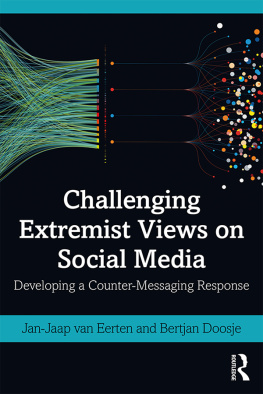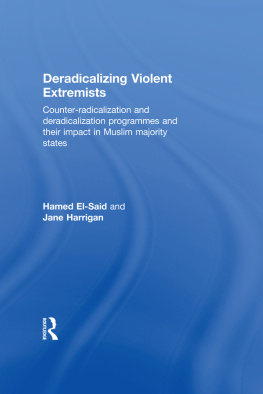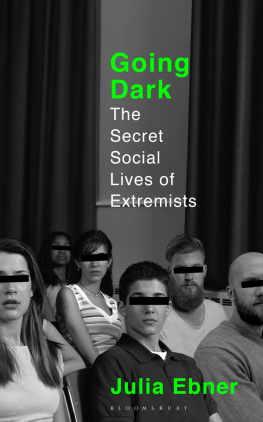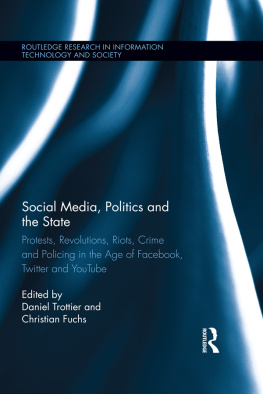CHALLENGING EXTREMIST VIEWS ON SOCIAL MEDIA
This book is a timely and significant examination of the role of counter-messaging via social media as a potential means of preventing or countering radicalization to violent extremism.
In recent years, extremist groups have developed increasingly sophisticated online communication strategies to spread their propaganda and promote their cause, enabling messages to be spread more rapidly and effectively. Counter-messaging has been promoted as one of the most important measures to neutralize online radicalizing influences and is intended to undermine the appeal of messages disseminated by violent extremist groups. While many such initiatives have been launched by Western governments, civil society actors, and private companies, there are many questions regarding their efficacy.
Focusing predominantly on efforts countering Salafi-Jihadi extremism, this book examines how feasible it is to prevent or counter radicalization and violent extremism with counter-messaging efforts. It investigates important principles to consider when devising such a program. The authors provide both a comprehensive theoretical overview and a review of the available literature, as well as policy recommendations for governments and the role they can play in counter-narrative efforts.
As this is the first book to critically examine the possibilities and pitfalls of using counter-messaging to prevent radicalization or stimulate de-radicalization, it is essential reading for policymakers and professionals dealing with this issue, as well as researchers in the field.
Jan-Jaap van Eerten is a Researcher at Labyrinth Research and Consultancy in Utrecht, the Netherlands. He received his Masters degrees in Islam in the Modern World and Conflict Studies and Human Rights from the University of Utrecht in 2012 and 2013, respectively. From 2015 to 2017 he conducted research into the utility of social media counter-messaging for radicalization prevention and de-radicalization as part of the research team of Bertjan Doosje at the University of Amsterdam.
Bertjan Doosje was Professor of Radicalization Studies in the Department of Social Psychology at the University of Amsterdam, the Netherlands from 2013 till January 1, 2019. He is currently Associate Professor there. He received his PhD on stereotyping in intergroup contexts in 1995 (cum laude). Since then he has examined intergroup relations in general and, after 9/11/2001, he has developed a special focus on radicalization and terrorism.
CHALLENGING EXTREMIST VIEWS ON SOCIAL MEDIA
Developing a Counter-Messaging Response
Jan-Jaap van Eerten,
Bertjan Doosje, Elly Konijn &
Beatrice de Graaf
With the cooperation of Marille de Goede
First published 2020
by Routledge
2 Park Square, Milton Park, Abingdon, Oxon OX14 4RN
and by Routledge
52 Vanderbilt Avenue, New York, NY 10017
Routledge is an imprint of the Taylor & Francis Group, an informa business
2020 Jan-Jaap van Eerten & Bertjan Doosje
The right of Jan-Jaap van Eerten & Bertjan Doosje to be identified as authors of this work has been asserted by them in accordance with sections 77 and 78 of the Copyright, Designs and Patents Act 1988.
All rights reserved. No part of this book may be reprinted or reproduced or utilized in any form or by any electronic, mechanical, or other means, now known or hereafter invented, including photocopying and recording, or in any information storage or retrieval system, without permission in writing from the publishers.
Trademark notice: Product or corporate names may be trademarks or registered trademarks, and are used only for identification and explanation without intent to infringe.
British Library Cataloguing-in-Publication Data
A catalogue record for this book is available from the British Library
Library of Congress Cataloging-in-Publication Data
A catalog record has been requested for this book
ISBN: 978-0-367-25311-0 (hbk)
ISBN: 978-0-367-25315-8 (pbk)
ISBN: 978-0-429-28714-5 (ebk)
Typeset in Sabon
by Wearset Ltd, Boldon, Tyne and Wear
CONTENTS
Narratives are powerful tools in the hands of extremist groups. To what extent is it possible to produce convincing and effective counter-narratives? In this book, we aim to answer this question. This book is based on a report that was commissioned by the Research and Documentation Centre (WODC-2607), Ministry of Security and Justice, The Netherlands. That report was authored by Jan-Jaap van Eerten, Bertjan Doosje, Elly Konijn, Beatrice de Graaf, and Marille de Goede. Subsequently, we have updated the report and placed it in an international context. We thank Marille de Goede for her contribution.
In addition, we like to thank the following people for providing valuable and constructive comments on an earlier draft: Danil Wigboldus (Radboud University, Nijmegen), Michael Kowalski, Frederike Zwenk, and Casper van Nassau (all from Ministry of Security and Justice, The Hague), Stijn Sieckelinck (Free University, Amsterdam), and Reint-Jan Renes (University of Applied Sciences, Utrecht).
Finally, we thank the people involved in the production of the book: Alex Howard, Ashleigh Phillips, Eleanor Reedy, Emma Critchley, and Pete Waterhouse (great editing!). Thank you very much for your friendly help and significant input.
Jan-Jaap van Eerten and Bertjan Doosje
Utrecht/Amsterdam, June, 10, 2019
Violent extremist and terrorist groups across the ideological spectrum have become increasingly adept in exploiting social media to advance their goals (Bartlett & Reynolds, 2015). Among other things, they use these channels to target youngsters by using smartly crafted messages and slick videos promoting their ideas, with the aim of shaping the perceptions of these youngsters and recruiting them to the cause (van Ginkel, 2015). Islamist and far-right extremist and terrorist groups in particular have made ample use of social media for this purpose (Rieger, Frischlich, & Bente, 2017). For example, since its inception in 2014, ISIS unleashed an unprecedented social media effort to spread its propaganda to thousands of online sympathizers across the world (Speckhard, Shajkovci & Bodo, 2018).
The extent and availability of violent extremist propaganda online has caused considerable public and governmental anxiety in the West. In part, because it is feared that it may radicalize individuals into violent extremism (Conway, 2016). Radicalization may be understood as the process by which people increasingly adopt more extreme attitudes and behavior, which might involve approval of the use of violence by others or displaying this violence to stimulate fear in the general population in an attempt to instigate changes in society (Doosje et al., 2016). This process may lead individuals to become involved in already violent extremist or terrorist groups. For instance, online propaganda of ISIS and other extremist groups is said to have had a radicalizing effect on many youngsters, leading them to travel and become foreign fighters in conflict zones such as Iraq and Iran. Yet it may perhaps also influence individuals (i.e., lone wolves; McCauley & Moskalenko, 2014) or small groups to engage in violent actions on their own.
Unsurprisingly, Western governments and other concerned actors have sought to tackle the threat of violent extremist communications online. Among the measures undertaken are counter-messaging activities (also known as counter-narrative messaging). These are essentially online communication activities intended to undermine the appeal of messages disseminated by violent extremist and terrorist groups (Briggs & Feve, 2013). In recent years, it has gained widespread acceptance that such efforts can help prevent and counter radicalization into violent extremism. The European Union appears also to have embraced the counter-messaging approach (Glazzard, 2017). In its Revised Strategy for Combating Radicalisation and Recruitment to Terrorism, the European Council (2014, pp. 89) emphasized responding promptly to online rhetoric supporting terrorism and to reach those most vulnerable to radicalising messages and it explicitly encouraged efforts on the internet and social media to promote counter narrative messages.













